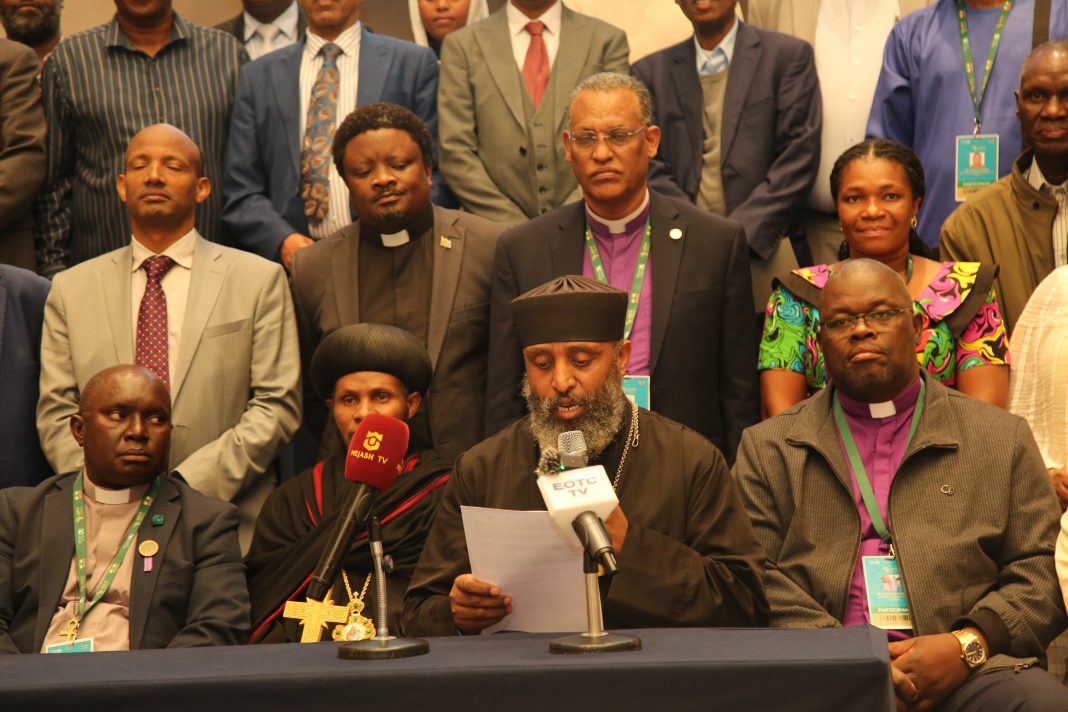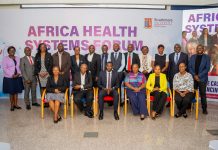By Milliam Murigi
African religious leaders have launched the Addis Ababa Faith Declaration on Climate Justice, calling for debt cancellation, fair climate finance, and protection of vulnerable communities as the climate crisis deepens.
The declaration, unveiled at a pre-summit workshop ahead of the second Africa Climate Summit, represents months of interfaith consultations and discernment across the continent.
It was convened by the ACT Alliance, the Ethiopian Orthodox Church Development and Inter-Church Aid Commission (EOC-DICAC), the Inter-Religious Council of Ethiopia, the All Africa Conference of Churches, and the Consortium of Climate Change Ethiopia.
“Faith institutions and traditions offer hope in a complex world. Their role in addressing climate change and pursuing climate justice is unequivocal. This declaration signals a new era where African faith communities lead the pursuit of fair, equitable, and just climate action,” said Julius Mbatia, Climate Justice Programme Manager at ACT Alliance.
The declaration outlines a series of priorities aimed at advancing climate justice across Africa. It calls for peace for climate justice by integrating peacebuilding, equity, and inclusive governance into adaptation efforts, recognising that peace and resilience are inseparable.
It urges debt cancellation to free African economies from crippling financial burdens that limit resources for climate action. On climate finance, the declaration demands the delivery of overdue, grant-based funds to support adaptation, loss and damage, and community-led initiatives.
“We call on global leaders, international financial institutions, and private lenders to embrace a new Jubilee, cancelling unjust debts so that African nations can redirect their resources toward protecting creation, building resilience, and supporting the most vulnerable. Without this moral and financial reset, Africa’s people and ecosystems will remain trapped in cycles of debt, disaster, and despair,” said Mbatia.
Faith leaders also pressed for ambitious emission reductions by major emitters while advancing a just and inclusive energy transition in Africa that creates jobs, protects workers, and expands clean energy access.
According to them, the heads of state of the most advanced economies, that alone are responsible for more than 75 per cent of global emissions, should set more ambitious emission reduction targets before COP 30, targets that operationalize COP 28 Global Stocktake energy targets. This is a prerequisite to maintain the 1.5-degree guardrail, acknowledging that it is unjust to both people and the planet to backtrack emission reduction efforts.
“Climate change is not just an environmental issue, it directly threatens lives, livelihoods, and communities across Africa. We call on leaders at the second Africa Climate Summit to deliver adaptation finance, support indigenous solutions, expand renewable energy, and create inclusive, resilient systems,” added Dr. Tinashe Gumbo, Programme Executive for Economic and Ecological Justice at the All Africa Conference of Churches.
Apart from that, the declaration further highlights the need to promote food sovereignty and creation care by scaling up indigenous and faith-rooted practices that sustain biodiversity and strengthen food systems. It underscores the urgency of closing Africa’s adaptation gap through sufficient grant-based funding, robust indicators, and the integration of climate risk into local and national planning.
The declaration also advocates for advancing loss and damage efforts by ensuring that African countries have equitable access to the Loss and Damage Fund. In addition, it calls for inclusive leadership that places youth, women, people with disabilities, and interfaith solidarity at the centre of climate solutions and decision-making processes.
“The Ethiopian Orthodox Church proclaims that creation is a sacred trust from God. From our sacred Church Forests to the traditional practices that sustain food and life across Africa, protecting creation is both a spiritual duty and a path to resilience,” said Abune Bernas, Archbishop of the Ethiopian Orthodox Church.
Africa is on the frontlines of the climate crisis, bearing immense annual losses while receiving only a fraction of the support required. Most available funds are directed to mitigation, with little allocated to adaptation and almost none reaching Loss and Damage needs. COP29 left the New Collective Quantified Goal (NCQG) unattended, creating further uncertainty and deepening the injustice that Africa faces. This situation demands both continental resolve and international accountability.
According to faith leaders, the required adaptation finance should not increase the debt burden of already struggling, vulnerable and poor nations. The reason is, debt imperils economies and it is deeply unjust if finance meant to address the climate crisis, safeguard life and livelihoods drives greater debt burden in these nations. Instead, it is an imperative of justice that carbon emitters pay for the damage they cause and offer reparation to poor and vulnerable nations.
“We urge African leaders to go beyond the unfinished outcomes of COP29 by uniting behind a bold, uncompromising position at the Africa Climate Summit and in the lead-up to COP30. Leaders must advocate for an NCQG implementation with a fair share for adaptation, and loss and damage finance, and direct, unconditional grant-based support to vulnerable communities,” added Mbatia.







